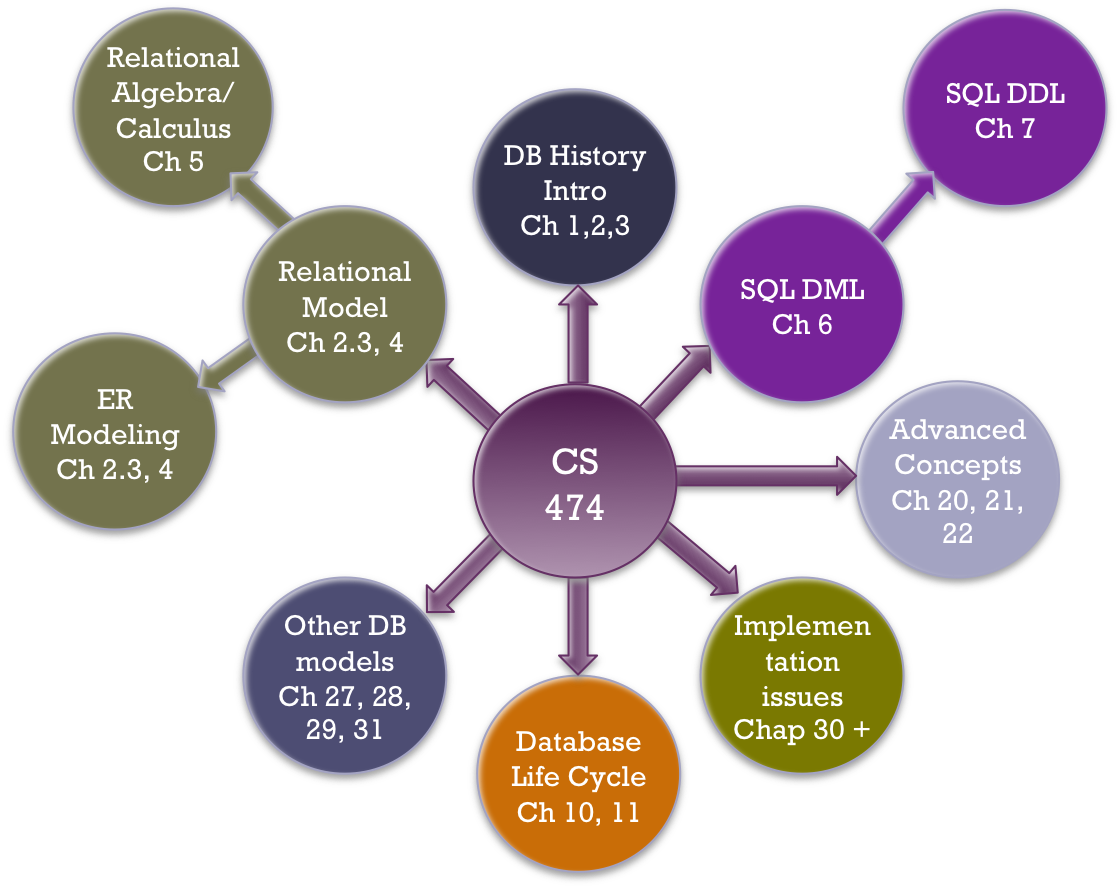

CS 474 Syllabus - Spring 2011
Database Design and Application
Quick
Reference
| Course
Meets: |
|
Section 1: M/W/F 9:05 - 9:55 in ISAT/CS 243
(alternate location ISAT/CS 248 for lab work)
|
| Course
Schedule: |
|
Course
Schedule |
|
Instructor
Information
Nancy
Harris
|
|
Office: ISAT/CS
Room 217 |
| |
Phone: 568-8771
(8-8771) |
|
|
E-mail: harrisnl
with usual jmu extension |
| |
AIM: harrisnl55
Gmail: csharrisnl
|
| |
Office hours See Schedule
|
| |
Instructor
Policies |
Description:
Students study database design and management with emphasis placed
on data definition languages, data manipulation languages, query
languages and on management of the database environment.
Prerequisite: CS 345 or CS 274, or ISAT 340.
Goals and Objectives
This course provides an introduction to the theory and practice of modern
relational database systems. By the end of the course, you should be able to
demonstrate your understanding of:
- the goals, functions, models, components, applications and social impact
of database systems,
- how to evaluate suitable searching strategies according to the type of
query,
- how to evaluate the advantages and disadvantages of alternate solutions
to conceptual modeling problems,
- the concepts of the relational data model and the concept of a
non-procedural query language,
- the mapping between a conceptual model and a relational schama,
- the anomalies that can occur within a database and how to correct them
through a normalization process,
- the computational aspects of a relational model,
- the concepts of the client-server architecture and how a database
management system can be used to create a small client-server application,
- the use of SQL to query, update, and manage relational datagbases.
In addition, you will install and gain a working understanding of a
commercial-grade database system and the means to create a functioning
application.
Class Format:
We will meet in the classroom most days. During those days we will have a
combination of lecture for some material and group work for other material or a
combination. During a few class periods, we will meet in the lab.
The group work will consist of POGIL or POGIL like activities.
http://www.pogil.org/ - for more
information.
See link for the schedule. The
schedule is subject to change and will be filled in more specifically as we work
through the topics.Communication:
We will use Blackboard and the
web as a means
of communicating. Announcements for class will be made on the
Blackboard
announcements page or the course schedule page if Blackboard is unavailable.
Any
other announcement that you receive through other means (such as
e-mail) is
suspect unless confirmed by Blackboard or the course web page. If I
send an e-mail to the class as a whole, I will also
put the text into a Blackboard or web announcement. If school is
cancelled due to snow days, be sure to check the announcements for any
due date changes or homework assignments.
Also, use my office hours if you
are having difficulty, or just need clarification on an assignment or
with something that you are working on. Office hours belong to
the students and is a good way for us to communicate individually.
Textbook and Required Material
- Required: Thomas Connolly and Carolyn Begg, Database Systems, A Practical Approach to Design, Implementation, and Management (5th edition) (Addison-Wesley, 2010).
Optional: Ramon Mata-Toledo and Pauline Cushman, Fundamentals of SQL
Programming - Shaum's Outline Series (New York: McGraw Hill, 2000).
- For
both of these books, if you want to share a copy with a colleague in
class, that would be fine. We will, however, be making extensive
use of the required text for background reading and homework
exercises. You may obtain the textbooks at any of a number of
online sites or the campus bookstore.
Grading
We are going to grade on a contract grading system.
For each category of work, you will choose what percentage of your grade will be
based on that category. See Assignments tab for the contract form.
You must choose a percentage within the range (inclusive).
| Exam 1 |
5 - 20% |
| Exam 2 |
15 - 25% |
| Final Exam |
20 - 30% |
| Major group project |
20 - 25% |
| Mini individual project |
0 - 15% |
| Lab, homework, class participation |
5 - 15% |
I generally grade exams and projects on a 100 point scale.
Letter grades correspond to 10 point ranges...90 - 100 = "A", 80 -
89.999 = "B", etc. "F" is used for work below 60%. Labs,
homework, wiki participation grades will be based on an A, B, C, F
scale. Final grades will be based on your contract and will
include + / - grades for extremes within a range.
Class Policies and Student Success
See the link above for general instructor policies. Specific policies and
items which will insure your success in this class are:
- Come to class, come to class, come to
class - Students who attend class regularly will keep up with the
workload better, will gain insights from talking with classmates or the
instructor, and will do better in this class as a result. We use
a lot of active learning in class so attendance is mandatory. While I
will not take formal attendance, you will lose points if in-class work
or homework is collected during a class period.
- Workload -There will be ongoing assigments throughout the
semester for the major project. In addition, there will be reading and
reading preparation before most classes. Expect some kind of homework to
prep for most classes.
- Study Guide Wiki - We will have a study guide that you will contribute to. You
will find that if you take some time each week to review and summarize
what you have learned, studying for the exams will be less onerous.
Contribute to the wiki!
- Late assignments - All homework ius due at the beginning of class on the day that they are due. No late
assignments will be accepted for credit, although I will review late
assignments at your request. For project assignments, late
assignments will have a 10% per day penalty associated with each deliverable.
- Exams - We have two midterms and a final exam. It is
expected that all students will take the exams at the normally scheduled
time. If an emergency occurs which requires you to be away, let me know
as soon as you know about the situation. I may request documentation in
order to allow you to take a make-up exam.
- Honor Code - I report ALL
incidents of academic dishonesty to the Honor Council. If the violation
is severe, I will refer it to the Honor Council for formal resolution.
Less severe violations may be handled informally. If you know of
cheating in this class, it is your responsibility to let the instructor
know as soon as possible. If you are involved in a situation where you
are not sure if what you did was right or violates the Honor Code,
please see me for clarification. Examples of violations in this
class would include (but not be limited to): sharing answers with
another classmate on the exam; lifting work from the web for any
portion of the project; two teams collaborating on any of the project
deliverables; and individuals collaborating on the mini project. Things
that are okay to do in this class include:
working with others on homework; collaborating with others in building
wiki entries; working within your own team on anything related to the
project; and using example code that you may find on w3schools.com or
java.com with proper citation.
- Extra Credit - I generally do not have extra credit
opportunities.
Student Success - You will be successful in this class if
you:
- Attend class and each day and
actively participate.
- Engage with the material...don't passively listen in class and expect to do well on the application assignments.
- Ask for help when you need it. Ask
questions during lecture time.
- Get started early on assignments.
- Think about what you are doing...don't just do. In
this course, the why is more important than the what.
- Experiment with the database
management systems that we will be using.
If you need additional resources to help you with your learning, let me know.
Additional reference books may be placed in the library upon request and I have
some database books that you may borrow for short periods if you need additional
resources.
Students with
Disabilities: If you are a student with a documented disability, who
will be requesting accommodations in my class, please make sure you are
registered with the Office of Disability Services, Wilson Hall, Room 107
(568-6705) and provide me with a copy of your Access Plan letter outlining
your accommodations. I will be glad to meet with you privately during my
office hours to discuss your special needs. The sooner you can do this, the
better I can assist you in meeting your learning goals in this
course.
Student
Responsibility:
Student are responsible for adding and dropping courses via e-campus. The last
day to add a course for the Spring 2011 semester is Thursday, January 27, 2010
(signatures required after Tuesday January 18). The last day to drop a course
for the Spring 2011 semester with a "W" grade is Friday March 18, 2011. I do
not give "WP" or "WF" grades to students requesting a drop after the deadline
except in extraordinary circumstances.
Religious observance and other
planned absences:
Students who are unable to attend class due to religious observance, athletic
competition, academic competion or academic events may request deadline
extensions BEFORE the expected absence. I will do my best to accommodate your
special circumstances.
Snow day make-up: In the event of inclement weather, be sure to check our course Blackboard site for instructions.
In most cases our "make-up" will be an extra assignment to replace some
of the content that we would have done that day. If the missed day is a
lab day or a group meeting day, these will be rescheduled for the next
available class period.
For clarification of these and other instructor policies please refer to
the policies link.
Course topics




